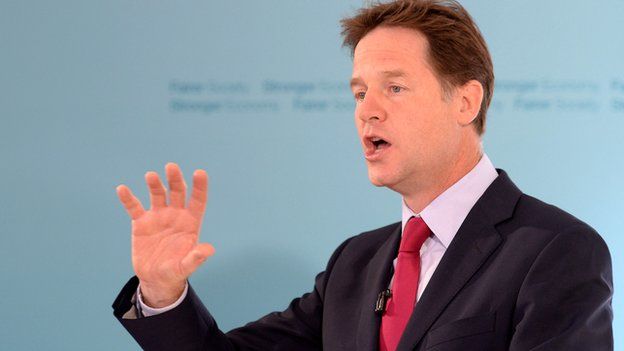Nick Clegg: England MP changes must happen alongside Scotland powers
- Published

Changes to the rules on Scottish MPs voting on England-only measures should be brought in at the same time as Scotland gets more control over tax and spending, Deputy PM Nick Clegg says.
Allowing Scottish MPs to vote on English matters "is simply not fair", the Lib Dem leader told LBC Radio.
UK leaders have promised new powers to Scotland if there's a No vote.
But First Minister Alex Salmond says only independence would deliver the powers Scotland needs.
The Yes campaign for Thursday's independence referendum described the pledge by David Cameron, Ed Miliband and Nick Clegg of more powers as an "insult to the intelligence of the people of Scotland".
A timetable for the new powers has also been set out, with a promise that they would be put in motion on Friday if there is a No vote, with draft legislation due to be published in January 2015.
'Not logical'
But the proposed transfer of powers to Scotland has added to pressure from some MPs who want an end to the anomaly that allows Scottish MPs to vote on England-only issues.
Prime Minister David Cameron has acknowledged the problem will need to be addressed.
He suggested the government had a plan - as set out in last year's McKay commission report - on how MPs should deal with legislation that affects only part of the UK.
But speaking on his weekly LBC Radio phone in, Mr Clegg went further, arguing that when "legislation is passed to give these new significant powers on welfare, on borrowing, on tax raising powers for Scotland, that should be accompanied by a decision about how the votes are organised in Westminster".
He said: "Because clearly when you have that degree of devolution, saying that... a Scottish MP has precisely the same say over English matters in England as an English MP, doesn't make any sense. That's why you then decide how you divvy up votes in the House of Commons.
"I always felt you decide that at the same time as you take the next big step in devolution. It's not logical - it's simply not fair to say 'ok, we've a more devolved family that makes up the UK, but somehow that new devolution settlement isn't reflected in any way in changes in Westminster'. That doesn't make any sense - you have to make changes in Westminster as well."
But his fellow Liberal Democrat minister Danny Alexander - who is the most senior Scot in the cabinet - said creating "two different classes of MPs" would not work.
"There's no party proposing to take away the voting rights of Scottish MPs - that is not part of the agenda. It's not what's going to happen," he told Channel 4 News.
'Deadlock'
There will have to be fundamental changes to the UK Parliament if Scotland votes Yes on Thursday - most notably the end of MPs representing Scottish seats.
If there is a No vote the three largest UK parties each have a different list of powers that would be devolved, but all say they would hand more control over tax and spending to the Scottish Parliament.
The McKay Commission, chaired by former House of Commons clerk Sir William McKay, said decisions affecting England "should normally be taken only with the consent of a majority of MPs for constituencies in England (or England-and-Wales)".
But it ruled out an English Parliament, saying Scottish MPs would also be allowed to vote on issues affecting England to avoid creating two different classes of MP and provoking "deadlock between the UK government and the majority of MPs in England".
Instead, English MPs should have the majority on committees considering laws affecting England only.
The report was dismissed by critics at the time as a "fudge" - and the detailed response promised in March 2013 by the Cabinet Office has yet to materialise.
- Published16 September 2014
- Published15 September 2014